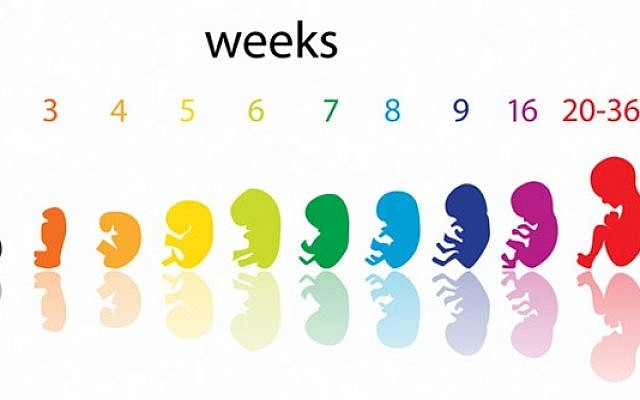YIR: Jewish Law and Abortion
Spurred by Georgia's "Hearbeat Bill," the AJT did a deep dive into the Jewish perspectives surrounding abortion.
Dave Schechter is a veteran journalist whose career includes writing and producing reports from Israel and elsewhere in the Middle East.

June 19, 2019
As of this writing, a federal judge has blocked Georgia from enforcing a new abortion law that was scheduled to go into effect Jan. 1.
If the state appeals the ruling, made Oct. 1 by Judge Steve Jones of the U.S. District Court for the Northern District of Georgia, that would be heard by the U.S. 11th Circuit Court of Appeals, in Atlanta. An eventual appeal to the Supreme Court of the United States by either supporters or opponents of the law is likely.
Jewish law applies the interpretation of ancient texts to present-day circumstances. The new Georgia abortion law cites advances in modern medicine as supporting the state’s right to restrict abortion, even if potentially in conflict with federal law.
Republican Gov. Brian Kemp signed the so-called “heartbeat bill” into law on May 7. The measure would ban abortion after a doctor detects a heartbeat, usually around six weeks into pregnancy. Existing Georgia law bans abortions after 20 weeks.
The new law would make exceptions “to avert the death of the pregnant woman or avert serious risk of substantial and irreversible physical impairment of a major bodily function of the pregnant woman. No such condition shall be deemed to exist if it is based on a diagnosis or claim of a mental or emotional condition of the pregnant woman.” Georgia also would make exceptions if the pregnancy is determined to be “medically futile,” or in cases of rape and/or incest — in the latter instances, if the pregnancy is not beyond 20 weeks and a police report has been filed.
Jewish law – halacha, in Hebrew, meaning to walk a path – differs from Georgia law on the issue of personhood and the circumstances under which abortion is permitted, though both make an exception if the life of the mother is endangered.
“Jewish law is not clear or unequivocal as to whether a fetus is ever a person and whether abortion could ever be murder,” according to an article co-authored by rabbi and Emory University law professor Michael Broyde.
The greater priority is the health and welfare of the mother. “Jewish law sees the fetus during the first 40 days of gestation as ‘simply water’ and during the rest of gestation ‘like the thigh of its mother.’ It does not become a full human being until birth, specifically, until the head emerges from the vaginal canal or, if a breach birth, when ‘the majority of the body’ or the shoulders emerge,” said Rabbi Analia Bortz, co-founder of Congregation Or Hadash. Bortz is also a medical doctor with post-doctorate studies in bioethics.
Unlike Jewish law, the Georgia statute does not consider psychological and emotional distress experienced by the mother as legitimate reasons to sanction an abortion.
Rabbi Jonathan Crane is the Raymond F. Schinazi Scholar of Bioethics and Jewish Thought at Emory University’s Center for Ethics. He said, “Modern streams of Judaism take very seriously both the physical and psychological well-being of pregnant women. This is demonstrated by the many resolutions by rabbinic organizations and pieces by Jewish bioethicists that say that rape and incest are legitimate reasons to terminate a pregnancy. Forcing a woman to gestate and give birth to a child begun by rape or incest imposes immeasurable psychological distress. Ensuring a woman’s mental well-being holds true for other pregnancies as well,” said Crane, who is also an associate professor of medicine in Emory’s School of Medicine and an associate professor of religion in Emory College.



comments